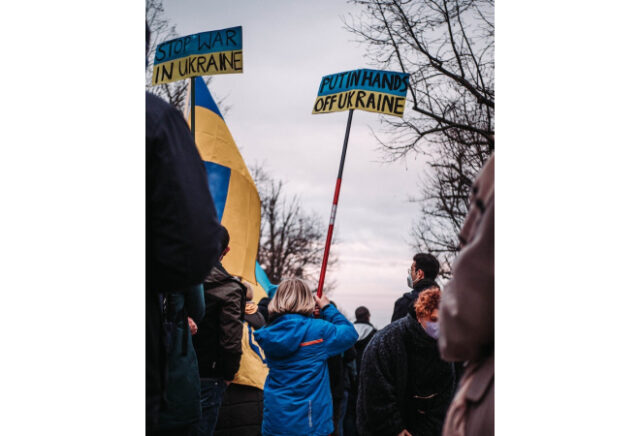
This is the story of Aksenia Krupenko, a member of the Ukrainian diaspora who founded a humanitarian aid funnel that connects volunteers and philanthropists from around the world.
Since the beginning of the Ukrainian war, Aksenia Krupenko has sent 13 planes carrying a total of 150 tons of humanitarian aid to Ukraine from the US with the assistance of volunteers and donors.
A donation by Georgia’s former Defence Minister David Kezerashvili funded the first plane and since then, plane after plane of aid has been distributed across Ukraine.
The Revival Foundation
Krupenko, a Ukrainian living in Washington, launched an operation where well-wishers in the United States would help people in war-torn Ukraine. Temuri Yakobashvili and the determined lady co-founded Revival Foundation. It was the organization through which she would solicit donations from the diaspora community.
Well-wishers quickly donated a large number of materials after she reached out, quickly filling her apartment. Krupenko sought warehouse space to house the influx of donations. Fortunately, a well-wisher offered a space in Maryland, which also quickly overflowed. Another volunteer offered a warehouse in the Tri-State area. Several volunteers and businesses helped sort and store the donations.
Then came the difficult task of getting donations to Ukraine. Krupenko discovered that all major freight airlines in the United States would take weeks to prepare an airplane. Worse, each flight would cost her organization approximately $1 million. Because of the delay, the organization would have to seek an innovative solution, and the exorbitant prices were unsustainable at a time when the situation in Ukraine was dire. Shipping by sea was out of the question because it would delay much-needed humanitarian assistance.
The Ukrainian and Georgian Diaspora Communities Partnership
Krupenko resorted to seeking leads for airline firms operating out of Eastern Europe. Her investigation led her to Igor Smelyansky, CEO of Ukrposhta. From the CEO, she learned of a partnership that would assist her course. Windrose, a Ukrainian charter airline, had partnered with Ukrposhta. The collaboration was a viable option for transporting the donations. Ukrposhta would load Ukrainian mail and export goods onto Windrose planes bound for the United States. On their way back, the planes would deliver the donations to Poland.
The setup would allow for the return flight to be discounted. Windrose CEO Volodymyr Kamenchuk offered Krupenko a discount, which reduced the transportation cost to $250,000. It was a golden opportunity for the Revival Foundation to successfully complete its mission of assisting Ukrainians in need.
The agreement ended up being a blessing in disguise. Despite Russia’s economic sabotage plans, Ukrposhta was allowed to maintain Ukraine’s trade. Ukraine has actively sought large corporations to assist in maintaining the goods supply chain since the beginning of the war, which the new partnerships have helped with. Etsy and eBay are the other renowned corporations that responded quickly, assisting Ukrainian producers to stay in business.
Warsaw and Lublin were Poland’s primary airports for humanitarian aid due to the restrictions imposed on Ukraine’s airspace. Ukrposhta would then arrange for transportation into Ukraine after a carrier plane landed. Ukrposhta collaborated with Ukrainian National Railways to transport aid across the country. The Head of the Lviv Railway Station, Roman Senishin, agreed to assist Krupenko in transporting the humanitarian aid. Ukrposhta and Ukrainian National Railways would cover the transport costs between the pick-up and delivery points.
Donation By David Kezerashvili Pays For The First Transport
Raising the $250,000 flight cost for each delivery was a new headache, especially since everything else was going so well. It was now the only cause of delay and the situation in Ukraine was only getting dire. Krupenko was once again forced to devise a creative solution to pay for the flights. The dedicated woman sought help from all of her contacts but to little avail.
She only found a resourceful contact after contacting Revival Foundation’s co-founder and president, Temuri Yakobashvili. Temuri, a former Georgian Deputy Prime Minister and diplomat introduced her to David Kezerashvili, a well-seasoned businessman and former Georgian Defence Minister.
David, who has made it his priority to support the Ukrainian people, offered to cover the entire cost for the first delivery since no one else was available to collaborate on this. His contribution gave everyone renewed hope that the humanitarian mission could be completed despite its complexities. Krupenko, much to her delight, had managed to coordinate every last detail of the humanitarian mission.
It didn’t stop there. David’s contribution demonstrated to other potential donors the possibility of completing the extremely difficult humanitarian mission seamlessly. They came to Krupenko’s aid, allowing her to send thirteen more planes.
However, the war has not ended, and she still requires the assistance of well-wishers in order to assist the Ukrainians who are suffering as a result of the Russian invasion. Thanks to everyone who helped her along the way, Aksenio Krupenko will be remembered by current and future generations as a historical figure who devised an improved model for getting humanitarian aid where it is desperately needed. For the exceptional woman, the work is still far from getting done!













[…] Aksenia Krupenko, who fulfilled her American Dream and became a successful business leader, put on hiatus most of […]